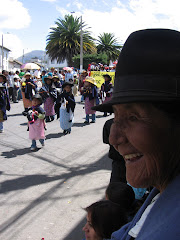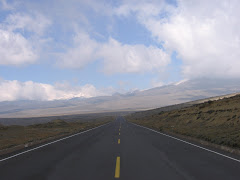Today the reason why I cannot stand to work with my counterpart agency was personified during a meeting with the youth group.
The only contact I have with my assigned counterpart agency is twice a week with my direct counterpart person. Lets call her Louisa. Louisa had promised them that we would watch a movie having to do with Afro-History, because that is what we discussed the last time we met. During the last meeting, Louisa had prepared a printout about Afro-Ecuadorian history for the group. It was actually really great—we read over the history and talked about how it related to the kids today. Well, really Louisa did most the talking, as it goes during most any charla she gives. She was pretty adamant during the charla, as it goes during most any time she is talking about Afro-Ecuadorian history. She gets really loud when talking about how Afro-people helped construct this country, both literally and figuratively, yet (in her opinion) are consistently denied any special rights to it as the indigenous people are. She tells the kids that they should be proud of who they are, proud of where they come from. That they should see all black people as their family, their brothers and sisters, embracing everything that is black about their neighbors and themselves.
So getting back to today—we watched a Danny Glover movie called Bopah!. It is about apartheid in South Africa, it was a pretty serious movie, had a feel similar to Hotel Rwanda. In the movie the police (which is run by white men, but dirty work is done by black men) are trying to take control of a city that is on the cusp of erupting with a revolution. Every time the revolutionaries would gather, the police would break it up with tear-gas, guns and beating batons. The twist is that Danny Glover is a police officer, but his son is one of the revolutionaries. The leader of the revolutionaries is taken to jail where he is severely beaten for refusing to speak and eventually killed. Although we discussed Afro-Ecuadorian history before, we did not discuss the premise of this particular film. I assumed that Louisa was going to do this, since it was her charla to plan and since I do not possess South African History
That’s part one of what bugged me: that she insists that since she follows what is going on, that everyone else does. Are we here for ourselves or are we here for the youth group? Yeah, that’s what I thought.
The revolutionary leader was an incredibly dark, dark black man; so dark that his lips were a purplish-brown color. Louisa made a comment about the “ugly” color of his lips and laughed along with the youth group at her own joke. When it was nighttime and the characters faces disappeared in the darkness, she laughed and said they should just close their eyes and mouths, that way the police would never find them. When a character with a large, flat nose was with his girlfriend, she made a joke about how could the girl want him with a nose like that? When Danny Glover’s character’s wife is screaming, pleading with her husband to leave the police force and respect his son’s efforts, she laughed that the woman was so overcome with emotion. When the police are beating people in the streets, sending people fleeing for their lives in all directions, she makes a “plop” sound as the baton hits their flesh. When the blacks are rejoicing, singing a song in a tribal-sounding language, she makes fun of the “do-digga-do” sound of their voices and the way that they dance.
And the youth group laughed right along with her every time. I ask again, are we here for ourselves or to teach the youth something? And what are we teaching them? Our words, or our actions?
The movie ended without a real conclusion, they don’t come out and tell you what happened with the characters involved. The youth group groaned complaints. Louisa asked me again (or just asked the air? I am sure she wasn’t actually talking to me, but I answered anyhow) how they could end the movie without telling you what happened? I said it was probably done on purpose. That this was a struggle that lasted for YEARS in South Africa. That the characters probably died for their cause, that a lot of people died during this time. She rolled her eyes at me, shook her head and said, “Yeah, yeah, whatever, Tere,” as though I were the one who did not understand the movie.





